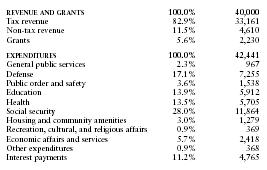Israel - Public finance
Israel has the most advanced economy in the Middle East, although the country has been plagued with political and social woes for much of its independence. The onset of the intifada in September 2000 threatened to reverse much of the economic progress that had been made in the prior few decades. The violence has left several industries, especially the tourism sector, in critical states. Also, Israel's sizeable external debt, which was equivalent to about 38% of GDP in 2000, has put a damper on the economy's expansion.
The US Central Intelligence Agency (CIA) estimates that in 2000 Israel's central government took in revenues of approximately $40 billion and had expenditures of $42.4 billion. Overall, the government registered a deficit of approximately $2.4 billion. External debt totaled $42.8 billion.
The following table shows an itemized breakdown of government revenues and expenditures. The percentages were calculated from data reported by the International Monetary Fund. The dollar amounts (millions) are based on the CIA estimates provided above.

| REVENUE AND GRANTS | 100.0% | 40,000 |
| Tax revenue | 82.9% | 33,161 |
| Non-tax revenue | 11.5% | 4,610 |
| Grants | 5.6% | 2,230 |
| EXPENDITURES | 100.0% | 42,441 |
| General public services | 2.3% | 967 |
| Defense | 17.1% | 7,255 |
| Public order and safety | 3.6% | 1,538 |
| Education | 13.9% | 5,912 |
| Health | 13.5% | 5,705 |
| Social security | 28.0% | 11,864 |
| Housing and community amenities | 3.0% | 1,279 |
| Recreation, cultural, and religious affairs | 0.9% | 369 |
| Economic affairs and services | 5.7% | 2,418 |
| Other expenditures | 0.9% | 368 |
| Interest payments | 11.2% | 4,765 |
Comment about this article, ask questions, or add new information about this topic: